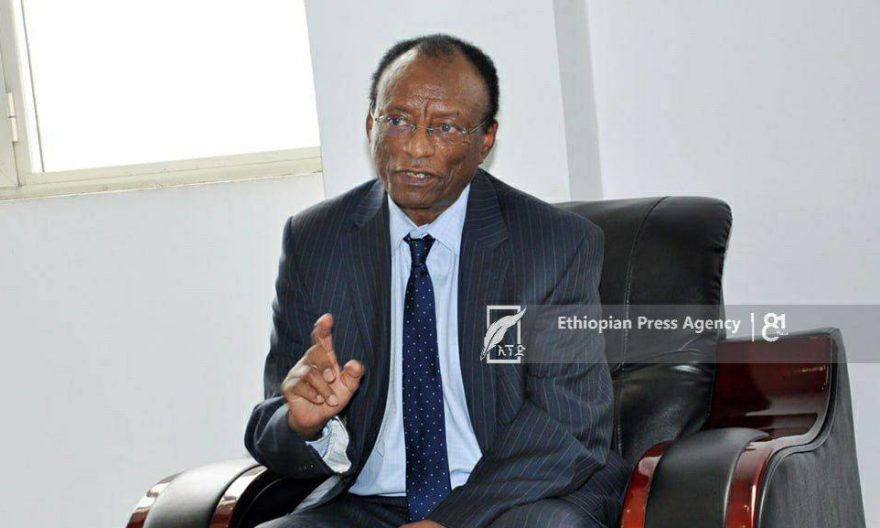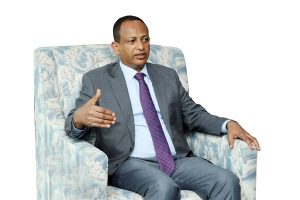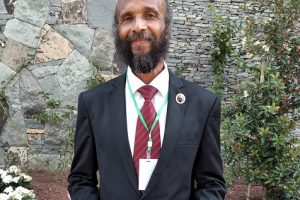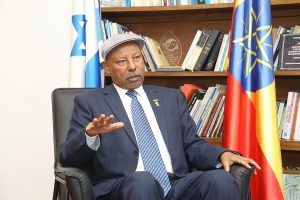
Today’s guest, Dr. Said Osman is an orthopedic spine surgeon. Though his families came from southern part of Ethiopia, he was born in border town called Moyale. By then, his father had been working for Kenya. He was raised in border area between Ethiopia and Kenya, however he did not worry about the boundary marked between the two countries.
He then went to school at Kenya side and went to Moyale Primary School, Marsabit Boys, Kang’aru High School and University of Nairobi. Dr. Osman obtained his Medical Degree with Honors from University of Nairobi, Kenya.
He went on to complete his Post-Doctoral Fellowship training in the United Kingdom at The Royal College of Surgeons of Edinburgh, Scotland, where he graduated as Fellow of the Royal College of Surgeons of Edinburgh in General Surgery. He then sub-specialized in Orthopedic Surgery and was honored as a Fellow of Royal College of Surgeons of Edinburgh in orthopedic surgery. Dr. Osman moved to the United States in 1992 as Spine Fellow at the University Hospitals of Cleveland.
Now, he permanently resides in Maryland, USA. He studied spine fellowship in Scotland, UK, but found the many problems associated with open surgery did not make sense for him to bring it home. Hence, he decided to explore the least traumatic, endoscopic surgical option, and that was what sent him to the USA.
Within three years as a Spine Fellow at the University Hospitals of Cleveland, Ohio, USA, with the support of Professor Marsolais,(M.D., PhD.) He developed three endoscopic spine techniques which are now being used routinely, worldwide. The only people who have not benefited so far are the ones for whom he decided to take this long and risky journey.
In the brief stay he had with the Ethiopian Herald, Dr. Said Osman told the cause, symptoms, treatments and socioeconomic impact of spine disease. Apart from treating patients, he conducts various researches in relation to spine surgery and has got international recognitions and patents. He would share us information about the spine surgery innovation, technology, statistics, and future plan to set up the Ethiopian Center of Excellence in Spine Care, which he want to share his experiences. Have a nice read!
You were born in border area of Ethiopia where there are various challenges and opportunities. Being born in border areas, How do you see it?
I think it is probably the best question anybody asked me. As a product of Ethiopia, Kenya whatever you want to call, my family is 100% Ethiopians and settle in the border. What is the experience I get from Moyale? When I was six years of age, my grandfather was a community leader in Moyale, Ethiopia. Emperor Hailesilassie recognized his contribution and gave him honorific title called Balambaras Wario Gobe. One day, there was a meeting between the British colony rulers on Moyale side and Ethiopian leaders of Moyale. The meeting is about cattle being stolen across the borders.
How to resolve all those things were the agenda of the meeting. They had a meeting outside our village in Kenya side. I was listening what they were talking about. My grandfather asked the British man various questions. How many times people from Ethiopian side invaded and stolen the cattle? How many cattle have been stolen? Was there any arrest? The British man did not have any answers. My grandfather was laughing in every question.
The local leaders in Moyale, Kenya side are shaking. They were not supposed to clap for this white man. They simply said yes, yes. I was very nervous and asked my mother; why my grandfather was laughing at them. If you are not smart, he doesn’t care to tell what he feels. That is the day when I feel, it is not the color of your skin that matters, it is what is in your brain. That is when I said well I can go anywhere as long as my brain.
People have the same culture of the border but one under colonial rule and the other independent and very proud of what they are. I am the pride of Ethiopian community benefiting from the British colony. I always walk from Kenya to the school in Ethiopia and my teacher bit me due to delay for schools. From that day on, I decided to study in Kenya. I had the opportunity to go to medical school. Benefiting both side earning so much. If I were from Kenya side, I did not have such experience. I learn good and bad from both sides.
You have made a lot of studies in spine surgery. How do you explain the achievement you recorded so far?
Depending on the condition being treated, endoscopic spine surgery cuts down operating time by 70-80%. This means less time under anesthesia, quicker recovery, and the opportunity to make the operating theatre available for another patient.
Surgery involves about half-inch incision, no cutting muscles or bones, and minimal blood loss. This means the patient may be able to go home the same day, thus making the hospital bed available for another patient. Early return to productive life means security for patient’s family. Because of minimal loss of blood, there is usually no need for blood transfusion unless there is an additional medical condition which necessitates transfusion. Because of minimal trauma, there is minimal risk of complications.
Complete set of “The Osman Approach” involves full range of care based on an integrated multi-specialty protocol to facilitate the delivery of an expeditious, value-based care. The treatment protocol of “The Osman Approach” is based on precise anatomic, MRI-based disease classification of the spinal condition which places the
patient on appropriate treatment protocol from day one! I developed and published the Classification.
I have invested a lot of time and money in developing multiple patents of biologic devices for disc replacement, vertebral replacement, various bone, and fixation of fractures, all without using metals. I hope to get them manufactured as Ethiopian products, in Ethiopia If that becomes a reality, expect Medical Tourism from the West and the East coming to Ethiopia to benefit!
As a Diaspora, who spent more than 42 years out of home, what did you bring for your country?
Ethiopia has about 65 million people in the working age-group of 15-54-years. 46% (30 million) of them have chronic back pain which forces them to work few hours a day, few days per week, or not working at all, leading to 70% loss of their production capacity. This translates into 30 million people with a production capacity of only 9 million healthy workers. Furthermore, 1.5 million of the chronic back sufferers require surgery today, because all non-operative measures have failed. Consider the impact of all this on the patients, families, the nation and investors in Ethiopia’s economy!
Chronic back pain does not get the attention it deserves! It progresses slowly and patients progressively adjust to its impact and because of lack of efficient technologic treatment, patients do not seek remedy until it becomes severely incapacitating. This means loss of good quality of life for years, loss of productivity to support families, and ultimately high expenses to the nation which must bear the burden of supporting them. The impact of chronic back pain may be much more severe than that of any regular epidemic, which gets immediate public attention.
I hope to set up the Institute of Advanced Endoscopic Spine Surgery (IAESS) in or near Addis Ababa. The Institute will provide treatment for patients and serve as a training center for spine surgeons, Pain Management providers, various Therapy specialists, nurses, etc. The emphasis will be on integrated, multispecialty services so that treatment will be efficient, and value based.
What is the significance of establishing a spine surgery center in Ethiopia? How it will be realized unless you get due support from local and international organizations?
The IAESS will serve as a hub of spine care for satellite institutions across Ethiopia and hopefully the African Continent. Once the initial phases of the IAESS are established, in response to the requests from multiple spine surgeons across Africa, I plan to establish the African Society of Advanced Spine Technologies – ASAST, which will be headquartered in Addis Ababa. The organization will be expected to quickly attract the attentions of international spine societies and industries because of its projected contribution to the spine care, globally.
The success of the project will be based, to a large extent, on my international profile as an innovator of modern spine technologies which I have shared in publications and conferences across the globe – USA, Canada, Germany, UK, Spain, Turkey, S.Korea, China, India, Brazil, Egypt, UAE.
In addition to clinical services, I hope to campaign for the establishment of the manufacturing capacity for biologic implants for the various skeletal abnormalities including, but not limited to, physiologic disc replacement, artificial biologic vertebral implants, biologic artificial bones, and implants for fractures. None of these devices are available anywhere in the world because of 100% reliance on metal and plastics.
The success to develop the IAESS depends on investments in this technology by the local and/or international entities. I have been campaigning for resources to launch this project with minimal progress so far, but hopes are high.
Most of Ethiopian citizens studied in abroad and became a scientist. However, they are facing various challenges in terms of getting advanced equipments to share their experiences to Ethiopian fellows. What sort of advice do you have for these professionals?
First of all what I want to tell my friends whom I met in the United States, Britain is one, it is perfect to learn a technology. The technology is not necessarily good as I explained to you. But the good things should stay in this place and what I tell to my friends is take the good things that you learn there, bring it home, take the good part of what we have here and combine the two. Here, you have got an Ethiopian product. When you come with that, you are not demanding some very high technology, start to bring here so that people can get benefit. It may be too expensive or it may be impractical to think about it. Pick something from US, bring and plant it in Ethiopia without change to it. That is what I have told everybody. This is my position. I have eight to nine patents that I have developed so that we can actually produce or manufacture devices to fix the problem in spine, broken bones and so on.
After you arrived here in Ethiopia, I am sure that you are sharing the experiences you developed so far to Ethiopian. How did you find them?
When I first came to ALERT hospital, the young neurosurgeons read a lot and said how can you do this surgery? After the first case was done without blood loses, the following day, they were eager to see that patient. They looked when the patient was walking around. There was no pain in his leg and this make them amazed. Surprisingly, the patient wanted to go home in the same day.
That is not aliquant lecturer or very fascinating videos and so on. It is a product. Whether it is a procedure or other, there is no 100 percent guarantee. There is always a risk. I told them to get all the scientific information and share it with the patient so that the patient at some point becomes part of the treatment team. As they do not rely on the MRI, if it is perfect, it is wonderful but you cannot feel it. So, that is why I said; even if everything looks perfect here, try something else.
Try injection to numb it and takeaway the pain. If it does, you are on the right truck and that information comes from the patient when minimizing risk of error. That is a culture found nowhere. Those are the sacrifices made in a hostile environment. People were saying this guy is dangerous. It would have impact in my livelihood. Being a Mobiya to do for the patient, teach the young physicians to learn that kind of approach and they can build on it. In my view, this is the best thing I can give to my motherland.
Thank you very much!
It is my pleasure!
BY GIRMACHEW GASHAW
THE ETHIOPIAN HERALD SATURDAY 30 SEPTEMBER 2023





